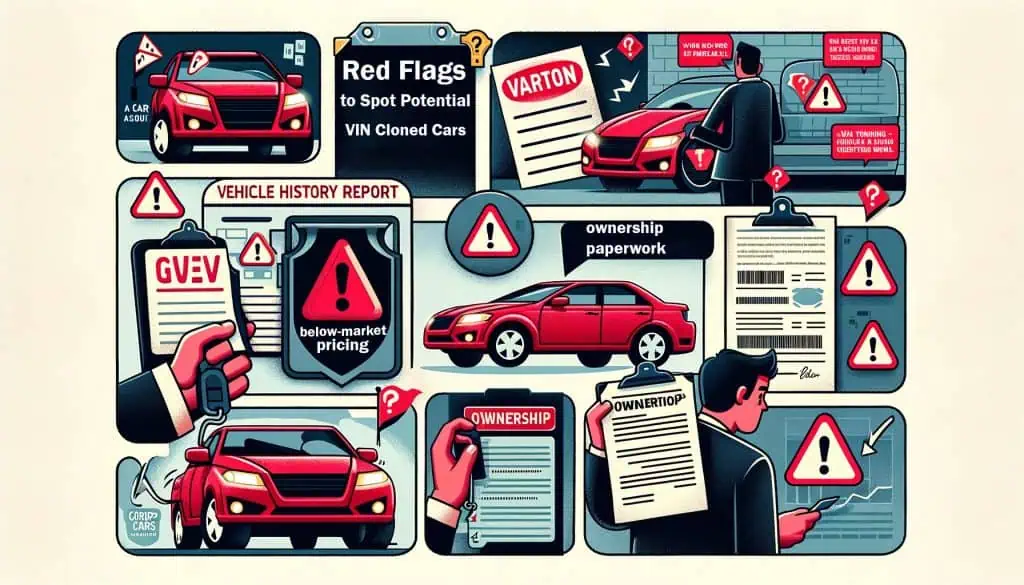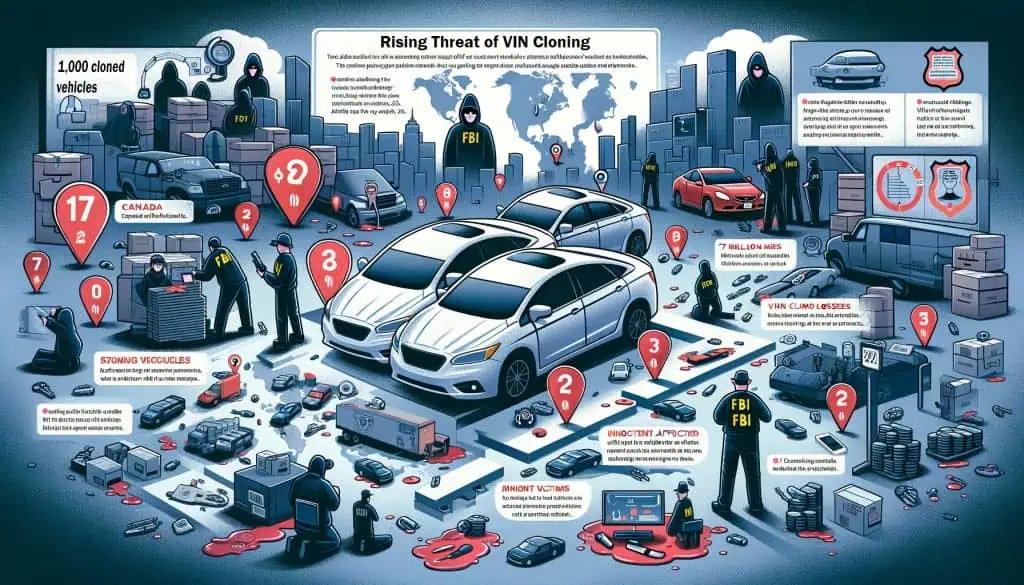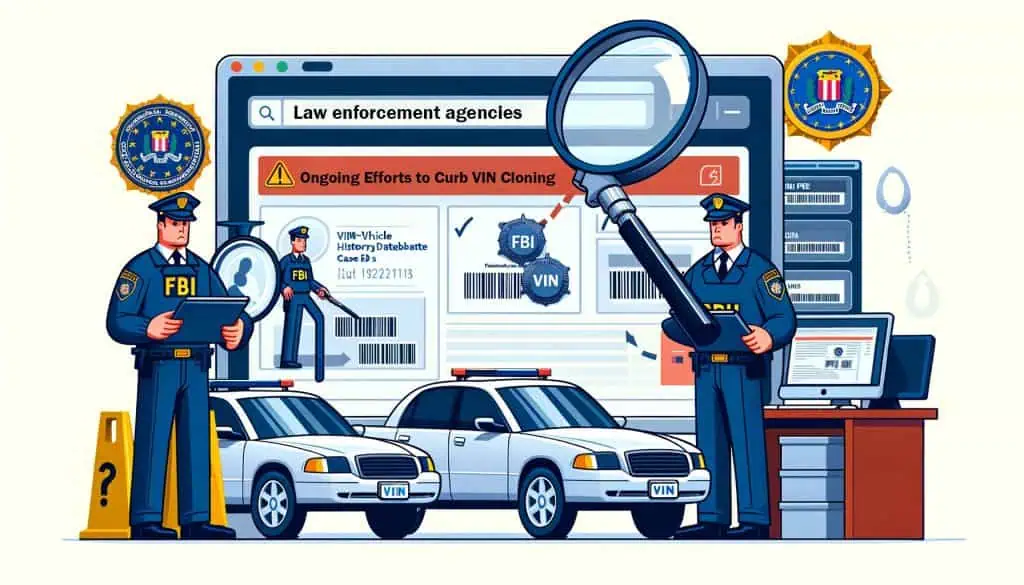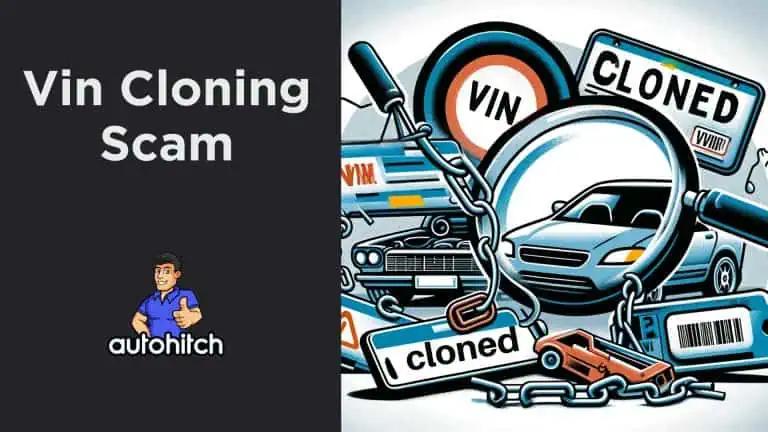Vehicle identification number (VIN) cloning is a growing form of auto theft that leaves many innocent victims in its wake.
What is VIN Cloning?
VIN cloning is a form of vehicle fraud where criminals steal the Vehicle Identification Number (VIN) from a legally registered vehicle and use it to disguise a stolen or salvaged vehicle as legitimate.
How it works is that they’ll actually replace the vin plates on the stolen or salvaged vehicle with fake vin plates they created that have the legal cars vin number on them.
The next step is to create fake ownership documents and sell the car to some unsuspecting buyer.
Table of Contents
Relevant Articles To Read:
- What Can Someone Do With Your Vin Number
- Red Flags or Signs Of a Car Scam
- 13 Car Buying Scams To Watch Out For
- How To Buy a Car From a Private Seller
- Lookup Vin Scam (Fake Vehicle History Reports)
How To Spot A Car That Has a Swapped or Cloned Vin Number

Here are a few tips to help you spot a car that has a swapped vin on it:
- Get the VIN from the seller before meeting and run it through databases like the National Insurance Crime Bureau’s VINCheck to see if it has been reported as stolen.
- Inspect the VIN plates on the vehicle carefully for any signs of tampering or scratches. Also, research where vin plates on that car are located to see if you can spot one the fraudster might have missed. The VIN should be consistent across all plates and documents.
- Order a Carfax or an Autocheck report to see if there was ever any severe damage or a salvage title issued
- Look over all the ownership docs like the Title, Registration, Etc. Try to spot errors or inconsistencies.
- Have the vehicle inspected by a trusted mechanic who is more equipped to identify Vin tampering.
- Avoid paying with cash to maintain a payment trail. Someone who insists on cash is more likely not to have the best of intents.
- Check the vehicle’s title with your state’s DMV to verify it matches the VIN and has not been previously branded as salvage.
What To Do if You Buy a Car With a Cloned Vin
There’s a possibility you’re only finding out about Vin Cloning after you have been the victim of it. If that’s the case, here is how you should handle it:
- Contact the police immediately and file a report for vehicle fraud
- Contact and report the purchase to your insurance company, but be prepared for them to cancel the policy as the vehicle will be deemed stolen
- Contact the Department of Motor Vehicles (DMV) in your state and report the cloned VIN. They will cancel the vehicle’s registration and title immediatly.
- If you financed the car contact your lender quickly because the last thing you need is to be accused of committing fraud. Explain the situation,, and they may be able to help you recover the funds.
- Try to locate the seller, but do not confront them directly as they have committed a crime. Provide any information you have about them to the authorities.
- If you purchased from a dealership, contact them immediately with the evidence and they may be able to assist or provide recourse. However, some unscrupulous dealers could be involved.
- Consult an attorney who specializes in vehicle fraud cases. They can advise you on the legal options and processes to recover any losses.
- Be prepared that you will likely lose the vehicle entirely as it is considered illegal contraband stemming from a crime. Your main recourse is attempting to recover the purchase funds.
The Rising Threat of VIN Cloning

- Over 1,000 cloned vehicles were uncovered in an FBI Florida case spanning 20 states and causing $27 million in losses
- Canada reports VIN cloning has grown with tech advances enabling larger theft rings
- A major challenge is the “large scale threat with innocent victims” it produces
While comprehensive statistics are lacking, law enforcement cases prove VIN cloning affects large numbers of car buyers annually across North America.
Documented Incidents of Vin Cloning Fraud:
Mike Cella, a retired teacher, had his Dodge Ram confiscated by police a year after he bought it when they discovered it was a cloned truck. Cella lost the $30,000 he paid and was still financing the vehicle.
An Edmonton man lost $20,000 he scrimped and saved for a used truck that was later seized as part of a cloning scam. He lost the vehicle but is still paying off the loan.
These stories illustrate the financial nightmare VIN cloning produces.
Ongoing Efforts to Curb VIN Cloning

Law enforcement agencies like the FBI actively investigate and prosecute VIN cloning fraud rings when found. Vehicle history databases also help prevent duplicate VINs from being registered across states.
My Final Thoughts
While technology aids these thieves, it also helps protect consumers. Being an aware, proactive buyer is your best defense against buying a cloned car.
Stay vigilant when buying used vehicles. Following these tips will help you avoid the financial nightmare of unknowingly purchasing a VIN cloned car.
Sources and References:
- https://www.fbi.gov/news/stories/2009/march/cloning_032409
- https://support.carfax.ca/en/support/solutions/articles/17000108072-what-does-cloned-vin-mean-
- https://www.cbc.ca/news/canada/calgary/vin-cloning-calgary-police-1.3526044
- https://www.thestreet.com/personal-finance/car-thieves-cloning-more-vins-from-stolen-cars-13494116
- https://www.nbcwashington.com/news/local/suv-bought-for-85k-is-sent-to-scrapyard-after-vin-fraud-how-to-protect-yourself/3353541/
- https://edmontonjournal.com/news/crime/edmonton-police-bust-alleged-vin-cloning-operation-recover-400000-property



